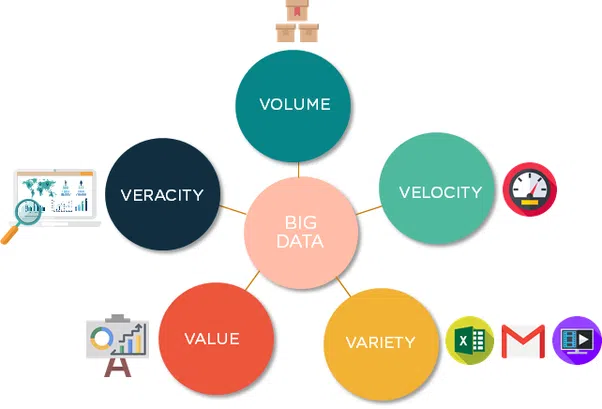The Future of Big Data and AI: What to Expect in 2023

Big Data Sekolahbahasainggris.co.id 2023 is a concept that refers to the enormous quantity of information generated by businesses, companies, and individuals on a daily basis. This data comes from various sources such as social media, online transactions, sensors, and more. The volume, speed, and variety of big data make it difficult to process and analyze using traditional data processing techniques. However, by analyzing large data sets, companies can identify patterns, trends, and relationships that they may have otherwise missed. This information can be used to improve customer experience, enhance business operations, and drive growth.
According to reports, the global big data analytics market is expected to reach a value of $103 billion by 2023. Many companies understand that big data analytics can help improve supply chain performance, inventory levels, and delivery times. The importance of big data in the business world is undeniable, and it is a critical and rapidly evolving area in the technology industry.
However, many challenges come with handling big data, such as processing and analyzing large amounts of information quickly and efficiently. Additionally, big data can be disorganized, making it difficult to fit into predefined categories or formats. Other challenges include data privacy and security concerns and finding skilled professionals to handle and analyze data.
To address these challenges, specialized tools and technologies are needed. Popular tools used in big data include Hadoop, Spark, NoSQL databases, and data visualization software. They aid in collecting, storing, processing, and analyzing large amounts of data quickly and efficiently.
The importance of big data cannot be overstated, as it offers valuable insights and information that organizations can use to make informed decisions. With the upcoming IEEE BigData 2023 conference, the opportunities for innovation and growth in the world of big data are sure to continue. As such, the importance of big data and its impact on society will continue to be a major topic in decades to come.
Introduction to Big Data Sekolahbahasainggris.co.id 2023
Big Data Sekolahbahasainggris.co.id 2023 is an upcoming significant global research event that will take place in Surinto, Italy. The event is the IEEE BigData 2023 conference, which will discuss the impact of big data on major societal challenges such as climate change, European and global policies. According to reports, it is expected that the big data analytics market will reach a value of $103 billion by 2023. Companies are aware that big data analytics can enhance supply chains, improve inventory levels, and delivery times. The event will offer a new configuration in the critical and fast-evolving world of big data. Big data is a contemporary concept in the technology and business world. It refers to the large volume of structured and unstructured data that inundates businesses on a day-to-day basis. However, it is not the amount of data that matters; rather, it is what organizations do with it. Big data can be analyzed for insights that lead to better decisions and strategic business moves. In this guide, Sekolahbahasainggris.co.id introduces the basics of big data analysis, discusses the three V’s of big data (volume, velocity, and variety), some common use cases, and briefly touches on the challenges associated with big data analysis. By the end of this guide, one should have a good understanding of what big data is and how it can be used to drive better business decisions.
Characteristics of Big Data
Big Data is a rapidly growing sector that involves the collection and analysis of large amounts of data to generate valuable insights that organizations can use to enhance their various aspects. Big Data possesses several core characteristics. Firstly, it deals with vast volumes of data that are not processed by traditional data storage or processing units, and it encompasses structured, unstructured, and semi-structured data that are collected from various sources. Secondly, Big Data is characterized by velocity, which refers to the speed at which data flows from sources such as social media sites, business processes, sensors, and mobile devices. Velocity also enables organizations to detect trends, patterns, and associations and respond rapidly to changing conditions. Thirdly, Big Data has value, which refers to the benefits that an organization can derive from the data. It can help organizations identify gaps in their operations, target new market segments, and enhance customer experiences, among many other things. Fourthly, Big Data possesses veracity, which relates to the reliability of the data. It involves filtering or translating data to manage it effectively. Lastly, Big Data is characterized by variety, which refers to the different types and formats of data, including textual data, audio files, PDFs, images, and log files, among others. In summary, Big Data is a vast and complex sector that requires specialized knowledge and expertise to maximize its potential.
Challenges in Processing Big Data
Processing big data poses numerous challenges that need to be addressed with agility. One major challenge is the lack of skilled professionals capable of running modern technologies and large data tools. Companies invest in the recruitment of skilled professionals and provide training programs to their employees to bridge the gap. Another challenge is the lack of proper understanding of big data and its importance. Organizations must provide workshops, seminars, and training programs for all employees involved in big data projects to inculcate a basic understanding of data concepts. Proper data storage is also a pressing challenge, as companies struggle to handle the exponentially growing amount of unstructured data they collect from various sources. Compression, deduplication, tiering, and the use of data handling tools such as Confusion are among the techniques used to tackle this challenge. Selecting appropriate technology for data analytics and storage also poses a challenge, as companies often get confused while making such decisions. Experienced professionals and big data consulting can help companies select the best tools supporting their specific scenarios. Lastly, integrating data from a variety of sources is a challenge that needs to be addressed to ensure accurate and meaningful analysis. Addressing big data challenges requires investing in technology, skilled professionals, automation, and providing an understanding of data concepts across all levels of the organization.
Future of Big Data and AI
The future of big data and artificial intelligence (AI) seems promising. With the advancement of technology, AI and big data are becoming increasingly embedded in our daily lives. The convenience and embeddedness of data collection within educational technologies, paired with computational techniques, have made the analyses of big data a reality. The key research trends in the domains of big data and AI are associated with assessment, individualized learning, and precision education. Moreover, AI and big data have the potential to influence the world’s economy by contributing to $15.7 trillion to global GDP by 2030. However, as with any new technology, there will be challenges. The governments should be devoted to supporting lifelong learning, offering teacher education programs, and protecting personal data. The education industry should develop reciprocal and mutually beneficial relationships to enhance academia-industry collaboration. Lastly, the optimal use of big data and AI requires an in-depth dialog between supporters of “cold” technology and “warm” humanity. It is vital to realize that technology, specifically the big data explosion and AI revolution, can bring new opportunities (and challenges) that can be best leveraged for pedagogical practices and learning.
Big Data in Retail and Marketing
Big data has become a game-changer for the retail industry, allowing businesses to optimize their pricing, streamline operations, and improve customer experience. With the help of sophisticated technology, retailers can now capture a wealth of data about their customers, including their shopping habits, geographic location and even social media activity. This large data set enables retailers to have a 360-degree view of their customers, creating a personalized engagement that customers have come to expect. Big data analysis can predict emerging trends, target the right customer at the right time, decrease marketing costs and increase the quality of customer service. By leveraging big data, retailers can streamline their back-office operations, maintain perfect stock levels throughout the year, and unlock the customer service data hidden in recorded calls, in-store security footage, and social media comments. Overall, retailers can gain significant benefits from using big data, such as gaining a competitive edge, increasing opportunities for growth, and providing a more meaningful shopping experience for their customers.




